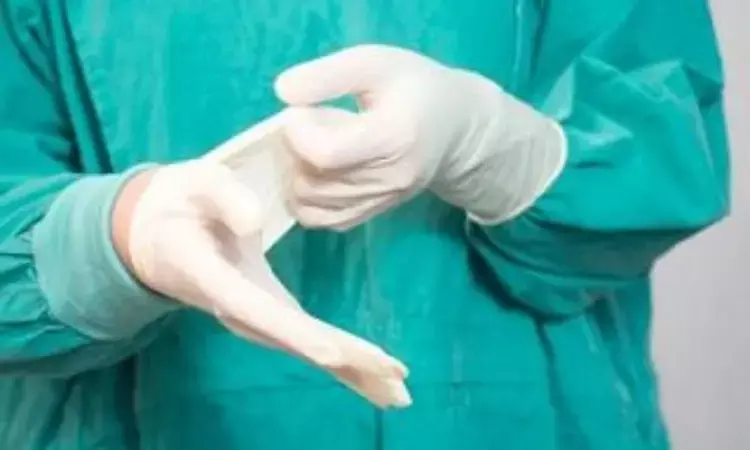- Home
- Medical news & Guidelines
- Anesthesiology
- Cardiology and CTVS
- Critical Care
- Dentistry
- Dermatology
- Diabetes and Endocrinology
- ENT
- Gastroenterology
- Medicine
- Nephrology
- Neurology
- Obstretics-Gynaecology
- Oncology
- Ophthalmology
- Orthopaedics
- Pediatrics-Neonatology
- Psychiatry
- Pulmonology
- Radiology
- Surgery
- Urology
- Laboratory Medicine
- Diet
- Nursing
- Paramedical
- Physiotherapy
- Health news
- Fact Check
- Bone Health Fact Check
- Brain Health Fact Check
- Cancer Related Fact Check
- Child Care Fact Check
- Dental and oral health fact check
- Diabetes and metabolic health fact check
- Diet and Nutrition Fact Check
- Eye and ENT Care Fact Check
- Fitness fact check
- Gut health fact check
- Heart health fact check
- Kidney health fact check
- Medical education fact check
- Men's health fact check
- Respiratory fact check
- Skin and hair care fact check
- Vaccine and Immunization fact check
- Women's health fact check
- AYUSH
- State News
- Andaman and Nicobar Islands
- Andhra Pradesh
- Arunachal Pradesh
- Assam
- Bihar
- Chandigarh
- Chattisgarh
- Dadra and Nagar Haveli
- Daman and Diu
- Delhi
- Goa
- Gujarat
- Haryana
- Himachal Pradesh
- Jammu & Kashmir
- Jharkhand
- Karnataka
- Kerala
- Ladakh
- Lakshadweep
- Madhya Pradesh
- Maharashtra
- Manipur
- Meghalaya
- Mizoram
- Nagaland
- Odisha
- Puducherry
- Punjab
- Rajasthan
- Sikkim
- Tamil Nadu
- Telangana
- Tripura
- Uttar Pradesh
- Uttrakhand
- West Bengal
- Medical Education
- Industry
Is intraoperative wound irrigation with aqueous PVP-I superior to saline for preventing surgical site infection?

Japan: The Centers for Disease Control and Prevention (CDC) and the World Health Organization have recommended intraoperative wound irrigation (IOWI) with aqueous povidone-iodine (PVP-I) for surgical site infection (SSI) prevention, albeit the insufficient evidence.
A recent study featured in the Annals of Surgery has stressed reconsidering this current recommendation of IOWI with aqueous PVP-I to prevent surgical site infection.
Surgical site infection is one of the most frequent complications after gastrointestinal surgery, with a reported incidence of about 10%-25%, which is higher than the rates seen with other surgery types. Postoperative infection often requires prolonged hospitalization and repeat surgery, which may compromise ultimate surgical outcomes.
Prophylactic antibiotics, in addition to patient warming and sterile procedures, have been shown to reduce SSI. Surgical site infection continues to occur despite the widespread use of prophylactic antibiotics and is devastating for patients. Several wound irrigation solutions have been used to reduce SSI, including antibiotics, soaps, and antiseptics.
Wound irrigation with an antiseptic solution, povidone-iodine, may be helpful for infection reduction, but it is of uncertain risk and efficacy. Povidone-iodine (Betadine) is an antiseptic solution comprising polyvinylpyrrolidone with water, iodide and 1% available iodine; it has bactericidal ability against an extensive array of pathogens.
Ryo Maemoto from Saitama Medical Center, Jichi Medical University in Japan, and colleagues aimed to evaluate the superiority of intraoperative wound irrigation with aqueous povidone-iodine compared to saline for reducing the incidence of surgical site infection in clean-contaminated wounds following gastroenterological surgery.
For this purpose, the researchers conducted a prospective, randomized, blinded-endpoint trial including patients ≥20 years old. Nine hundred forty-one eligible patients were randomized in a ratio of 1:1 to the study group or the control group using a computer-generated block randomization. In the study group comprising 473 patients, intraoperative wound irrigation was performed for one minute with 40 ml of aqueous 10% povidone-iodine before skin closure. In the control group, composed of 468 patients, the procedure was performed with 100 mL of saline. Analysts, assessors, and participants were masked to the treatment allocation. The incidence of incisional SSI in the intention-to-treat set was determined (primary outcome).
The researchers found that the incidence of incisional SSI in the study group was 7.6%, and in the control group, it was 5.1% (risk difference 0.025; risk ratio 1.484).
The researchers conclude, "the current recommendation of intraoperative wound irrigation with aqueous povidone-iodine should be reconsidered."
Reference:
Maemoto, Ryo MD*; Noda, Hiroshi MD, PhD*; Ichida, Kosuke MD, PhD*; Miyakura, Yasuyuki MD, PhD*; Kakizawa, Nao MD, PhD*; Machida, Erika MD*; Aizawa, Hidetoshi MD*; Kato, Takaharu MD, PhD*; Iseki, Masahiro MD, PhD*; Fukui, Taro MD, PhD*; Muto, Yuta MD, PhD*; Fukai, Shota MD*; Tsujinaka, Shingo MD, PhD*; Hatsuzawa, Yuuri MD, PhD*; Watanabe, Fumiaki MD, PhD*; Nagamori, Masakazu MD*; Takahashi, Jun MD*; Kimura, Yasuaki MD*; Maeda, Shimpei MD, PhD*; Takayama, Noriya MD*; Sakio, Ryotaro MD*; Takahashi, Rei MD*; Takenami, Tsutomu MD*; Matsuzawa, Natsumi MD*; Mieno, Makiko PhD†; Rikiyama, Toshiki MD, PhD*. Aqueous Povidone-Iodine Versus Normal Saline For Intraoperative Wound Irrigation On The Incidence Of Surgical Site Infection In Clean-Contaminated Wounds After Gastroenterological Surgery: A Single Institute, Prospective, Blinded-Endpoint, Randomized Controlled Trial. Annals of Surgery ():10.1097/SLA.0000000000005786, December 20, 2022. | DOI: 10.1097/SLA.0000000000005786
Dr Kamal Kant Kohli-MBBS, DTCD- a chest specialist with more than 30 years of practice and a flair for writing clinical articles, Dr Kamal Kant Kohli joined Medical Dialogues as a Chief Editor of Medical News. Besides writing articles, as an editor, he proofreads and verifies all the medical content published on Medical Dialogues including those coming from journals, studies,medical conferences,guidelines etc. Email: drkohli@medicaldialogues.in. Contact no. 011-43720751


